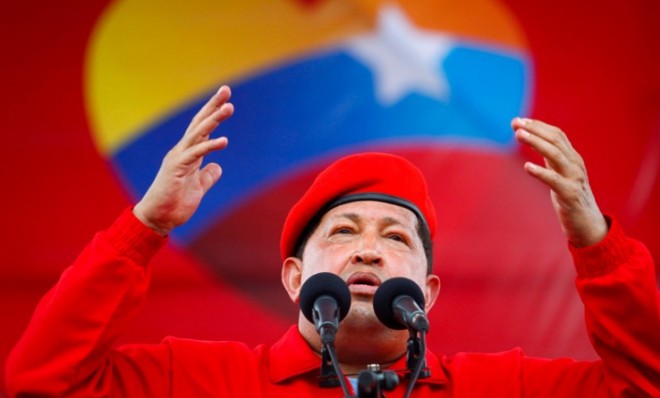4 ways of judging Hugo Chavez


A free daily email with the biggest news stories of the day – and the best features from TheWeek.com
You are now subscribed
Your newsletter sign-up was successful
Death has a way of canonizing even the worst scoundrels. But Hugo Chavez, the recently departed president of Venezuela, is one of those unique, almost ahistorical figures who polarizes, even in repose.
If you are an American foreign policy official or buy in to the Washington consensus, you view Chavez through the dichotomy of stability versus instability. Was he, fundamentally, a "stable force for the region?" In Washington, the world is broken up into regions largely dictated by the geography of the Cold War bureaucracy. Washington prizes stability above all else because stability does not impede the free flow of commerce or upset the balance of powers or force the U.S. to shift its resources. The verdict is clear: he was not. Forget his anti-American posturing. He was fundamentally destabilizing. (Mike Rogers, the House intelligence committee chairman, used that exact phrase today.)
If you're a social liberal, someone whose core system of valuation judges a leader on the basis of how many people he helped and lives he prolonged, Chavez comes out pretty well. He nationalized the state's oil industry and redistributed wealth to the poor. Human beings improved their lot because of Chavez. We can ignore this and focus on his poke-in-the-eye friendships with American enemies, but in doing so we significantly devalue the idea that human beings deserve food, water, shelter and health care.
The Week
Escape your echo chamber. Get the facts behind the news, plus analysis from multiple perspectives.

Sign up for The Week's Free Newsletters
From our morning news briefing to a weekly Good News Newsletter, get the best of The Week delivered directly to your inbox.
From our morning news briefing to a weekly Good News Newsletter, get the best of The Week delivered directly to your inbox.
Of course, his means were populist and authoritarian. As a civil libertarian, you find Chavez fairly reprehensible. He bullied the press. He terrorized his political enemies. He had little regard for the rule of law. He created an internal police state. A total louche. He was elected democratically and leaves no democratic legacy.
If you're an economic liberal who generally gets along with the worldview of The Economist, he was a disaster for the future of Venezuela's economic growth. His successor will probably have to re-privatize in order to keep the government afloat. Inflation is high, deficits are enormous, and the system of support he created for the poor is fraying.
A free daily email with the biggest news stories of the day – and the best features from TheWeek.com
Marc Ambinder is TheWeek.com's editor-at-large. He is the author, with D.B. Grady, of The Command and Deep State: Inside the Government Secrecy Industry. Marc is also a contributing editor for The Atlantic and GQ. Formerly, he served as White House correspondent for National Journal, chief political consultant for CBS News, and politics editor at The Atlantic. Marc is a 2001 graduate of Harvard. He is married to Michael Park, a corporate strategy consultant, and lives in Los Angeles.
-
 Corruption: The spy sheikh and the president
Corruption: The spy sheikh and the presidentFeature Trump is at the center of another scandal
-
 Putin’s shadow war
Putin’s shadow warFeature The Kremlin is waging a campaign of sabotage and subversion against Ukraine’s allies in the West
-
 Media: Why did Bezos gut ‘The Washington Post’?
Media: Why did Bezos gut ‘The Washington Post’?Feature Possibilities include to curry favor with Trump or to try to end financial losses
-
 Why Puerto Rico is starving
Why Puerto Rico is starvingThe Explainer Thanks to poor policy design, congressional dithering, and a hostile White House, hundreds of thousands of the most vulnerable Puerto Ricans are about to go hungry
-
 Why on Earth does the Olympics still refer to hundreds of athletes as 'ladies'?
Why on Earth does the Olympics still refer to hundreds of athletes as 'ladies'?The Explainer Stop it. Just stop.
-
 How to ride out the apocalypse in a big city
How to ride out the apocalypse in a big cityThe Explainer So you live in a city and don't want to die a fiery death ...
-
 Puerto Rico, lost in limbo
Puerto Rico, lost in limboThe Explainer Puerto Ricans are Americans, but have a vague legal status that will impair the island's recovery
-
 American barbarism
American barbarismThe Explainer What the Las Vegas massacre reveals about the veneer of our civilization
-
 Welfare's customer service problem
Welfare's customer service problemThe Explainer Its intentionally mean bureaucracy is crushing poor Americans
-
 Nothing about 'blood and soil' is American
Nothing about 'blood and soil' is AmericanThe Explainer Here's what the vile neo-Nazi slogan really means
-
 Don't let cell phones ruin America's national parks
Don't let cell phones ruin America's national parksThe Explainer As John Muir wrote, "Only by going alone in silence ... can one truly get into the heart of the wilderness"
